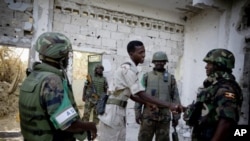It has been another violent year in Somalia with al-Qaida-linked al-Shabab militants establishing itself as a terrorist group that can strike beyond Somali borders. The U.N.-backed Transitional Federal Government, mired in its own internal problems, is still relying on African Union peacekeepers to keep insurgents from toppling the government and showing little sign that it will be able to establish a functioning administration before its mandate ends next August.
History in the world's most dangerous city seems to have ground to a halt. Since 1991, violence and warfare have become a fact of daily life on the Mogadishu streets, with one conflict blending into the next since the overthrow of Mohamed Siad Barre.
But since 2007, a new and more radical threat has confronted Somalia's fragile transitional government, threatening to overhaul southern Somalia and establish a harsh theocracy on the Horn of Africa.
Al Shabab (also known as "The Youth") entered the war-torn Somali scene in 2007 shortly after the Ethiopian Invasion. A successor to the Islamic Court's Union, the al Qaida-linked group has been battling the government to impose Sharia law in the country.
Somalia has never been short of armed insurgents, but 2010 saw Shabab develop into something more ominous. Over the course of the year, al Shabab seized most of southern and central Somalia. Despite the presence of the joint African Union and U.N. peacekeeping force AMISOM, the transitional government struggled to maintain its grip over the capital.
Al Shabab then seized world attention in July when it carried out twin suicide attacks in Kampala, Uganda killing 76 while they watched the final match of the World Cup. The blasts were carried out in retaliation for Ugandan troop presence in the AMISOM mission.
International Crisis Group analyst Rashid Abdi warns that al Shabab, once viewed merely as a regional threat, has become an international player.
"We are talking of an organization that has come of age," said Abdi. "It is no longer an appendage of al-Qaida, it is now a clone probably which is much more serious and has the ambition to globalize the jihad and has the footsoldiers to do it."
Emboldened by their actions in Kampala, al Shabab launched its Ramadan Offensive, vowing to oust the fractured Somali government from Mogadishu by early September.
One month of bloody fighting ensued, leaving hundreds dead. But miraculously, being pushed back, the AMISOM and Government troops were able to repel the rebel advances and pick up territory of their own.
The gains were highly-touted as a step towards the end of al Shabab, but the celebration was short-lived. Violence has again picked up in Mogadishu, and a string of battles over the past few weeks have left more than 100 dead.
The commitment of the International Community has never wavered in the face of growing violence. In fact, the resolve to defeat Shabab has strengthened since Kampala. On December 22 the United Nation's approved an AMISOM troop increase from 8,000 to 12,000 and Uganda has in recent months promised to bring the number to 20,000 with international funding.
But Crisis Group's Rashid Abdi warns that a military victory in Somalia would be fleeting. Underlying the problem of al Shabab is the weak, U.N.-backed government facing it.
"There is no doubt that there isn't a military solution to this problem," added Abdi. "A temporary victory over al Shabab is feasible. But that creates a problem by itself because - at the moment - the government has no capacity to hold the territory which AMISOM will help it gain."
A large part of the problem in Somalia is the Transitional Federal Government's inability to eliminate al Shabab and impose order. Established in 2004, the government has been wracked by near constant infighting and corruption.
But a glimmer of hope has recently emerged. In October, President Sharif appointed American citizen Mohamed Abdullahi Mohamed as Prime Minister. Unknown to Somalia at the time, the appointment was criticized by local leaders.
But Mohamed's insistence on experience rather than clan affiliation and his appointment of a lean, technocrat heavy cabinet has garnered praise and raised some expectations. Despite the hopes, the new Prime Minister has only months to do what some believe impossible: oust al Shabab, deliver a constitution and hold national elections before the TFG mandate expires in August.
"The unanswered question is: are they really serious - the donors - about having a permanent government come August and how in the world are they going to do it," said U.S.-based Somalia Observer at Purdue University, Michael Weinstein. "How does this new government fit into that? You would have to have an extended mandate for this government to be able to actually see if it can accomplish anything."
Only time will tell if the current Somali government gets another chance to bring peace to Somalia, but one thing is clear: al Shabab will be waiting for whichever government turns up in 2011.
As Al Shabab Looms, Somali Government Running Out of Time




